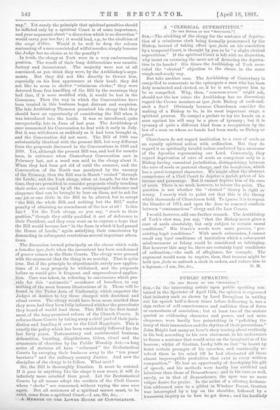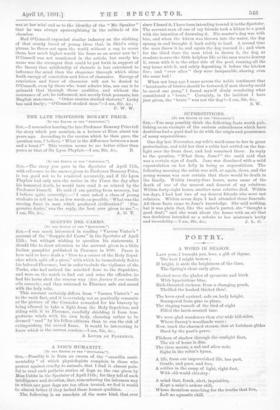PUBLIC SPEAKING.
ITO THE EDITOR or THE " SPECTATOR...1 Sire,—In the interesting article upon public speaking con- tained in the Spectator of April 11th, the opinion is expressed that industry such as shown by Lord Brougham in writing out his speech half-a-dozen times before delivering it, was a sign rather of self-consciousness and ambition than of force or earnestness of conviction ; but at least two of the orators quoted as evidencing character and power, and not mere eloquence, were hardly less painstaking in " polishing the irony of their innuendoes and the rhythm of their perorations." John Bright lost many an hour's sleep tossing about restlessly in his bed,- according to his own statement, in his endeavours to frame a sentence that would seize on the imagination of his hearers ; whilst of Grattan, Lecky tells us that "he learnt by heart certain passages of his speeches, and continually re- volved them in his mind till he bad eliminated all those almost imperceptible prolixities that exist in every written composition." He lost no opportunity of developing his gift. of speech, and his methods were hardly less artificial and laborious than those of Deinosthenes ; and in his case, as well,. surely, as in that of Demosthenes, the spur was no mere vulgar desire for praise. In the midst of a stirring declama- tion addressed once to a gibbet in Windsor Forest, Grattan was interrupted by a tap on. the shoulder, followed by a humorous inquiry as to how he got down ; and his landlady
was at her wits' end as to the identity of the " Mr. Speaker" that he was always apostrophising in the solitude of his chamber.
Had O'Connell expended similar industry on the clothing of that sturdy breed of young ideas that, in Shiers witty phrase, he threw out upon the world without a rag to cover them, how much higher would his fame as an orator now be ! O'Connell was not mentioned in the article, but surely his name was the strongest that could be put forth in support of the theory that artificiality of rhetoric is less calculated to influence the mind than the eloquence through which shine forth energy of conviction and force of character. Energy of conviction and force of character will not be denied to O'Connell, even by those who least admire him, nor can it be gainsaid that through these qualities, and without the assistance of art, he influenced, not merely Irish peasants, but English statesmen. " Other orators studied rhetoric," Lecky has said finely ; " O'Connell studied man."—I am, Sir, &e.,
F. W. W.



































 Previous page
Previous page